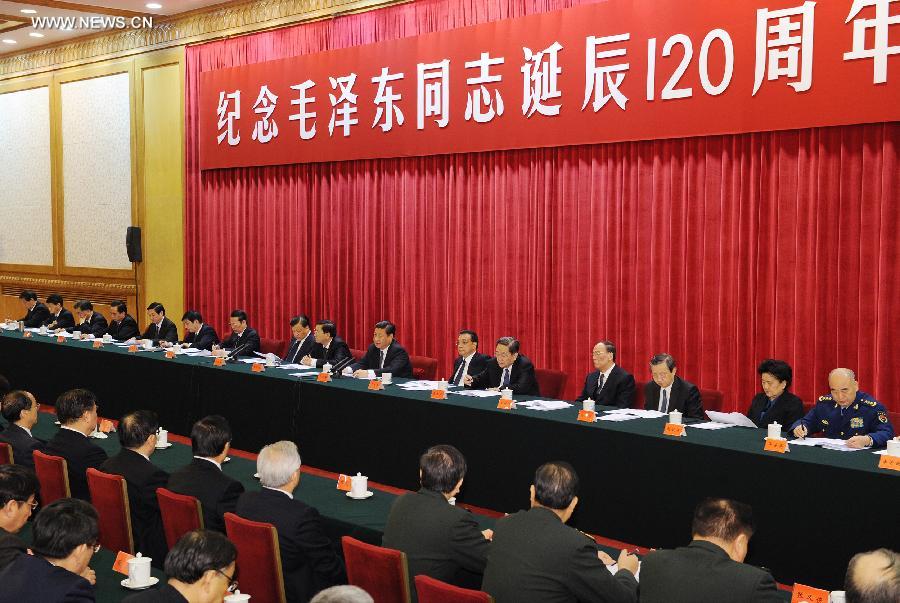 |
| A symposium commemorating the 120th anniversary of the birth of the late Chinese leader Mao Zedong is held in Beijing, capital of China, Dec. 26, 2013. (Xinhua/Rao Aimin) |
Under the new conditions, Party members should adhere to and make good use of the "living soul" of Mao Zedong Thought, namely seeking truth from facts, the "mass line" and independence, Xi said.
The CPC in June initiated a one-year campaign to strengthen the "mass line," a guideline under which the CPC is required to prioritize the interests of the people.
When interpreting the doctrine of "seeking truth from facts," Xi called on Party officials to soberly realize and correctly grasp the fact that China remains in the primary stage of socialism and will long remain so, uphold truth and correct errors for the interests of the people, and advance theoretical innovation based on practice.
The "mass line" is the lifeline and fundamental work principle of the Party, Xi added.
To implement the "mass line," Xi said it is important to adhere to the fact that people are the fundamental force to decide the Party's future and fate and called on Party members to serve the people wholeheartedly.
Xi asked officials to cherish the power entrusted by the people and subject power to the people's supervision.
The president underlined the importance of maintaining the "flesh and blood ties" between the Party and the people. Xi pledged to "make the greatest effort" to address problems of the Party, especially those that arouse people's complaints.
The people will be the "supreme arbiter" and "final judge" to assess the Party's work, he said.
The country will rely on its own strength for state and national development, maintain national pride and national self-confidence, and unswervingly walk a path of its own, he said.
The Chinese people will make the decision and handle affairs of the country. China will unswervingly step along the path of a socialism with Chinese characteristics and firmly follow the path of peaceful development and adhere to the independent foreign policy of peace, Xi said.
Since modern times, the Chinese nation has always been dreaming of realizing "great rejuvenation." Our predecessors made great efforts for making the dream come true. Today, based on their achievements, China's reform and opening-up drive and modernization have scored significant marks.
"China has never been so close to realizing the goal of the nation's great renewal," Xi said.
"To realize the great rejuvenation of Chinese nation, we must unswervingly advance reform and opening-up," he said, stressing that the Third Plenary Session of the 18th CPC Central Committee launched wide-ranging reforms.
The CPC plays a key role in realizing the great rejuvenation of the Chinese nation, Xi said, adding that the Party should administrate the Party, enhance its ruling capacity and strengthen the Party's capabilities, such as self-purification and self-improvement.
Xi vowed to "seriously treat 'illnesses' which harm the nature and purity of the Party and rip out any 'malignant tumors' on the healthy bodies of the CPC."
Persistent effort will enable the CPC to always be at the core of leadership for the cause of socialism with Chinese characteristics, Xi stressed.
Thursday's symposium at the Great Hall of the People was presided over by Liu Yunshan and attended by other leaders including Li Keqiang, Zhang Dejiang, Yu Zhengsheng, Wang Qishan and Zhang Gaoli.
Before the symposium, the seven top leaders visited Mao's mausoleum in Tian'anmen Square, making three bows toward Mao's seated statue and paying their respects to the remains of Mao.
Mao was born on Dec. 26, 1893 and died on Sept. 9, 1976.
Across China, people held various activities on Thursday to mark the anniversary of Mao's birth.
At Mao's birthplace in Shaoshan Village in central Hunan Province, locals were joined by visitors for commemorative events. They ate noodles, sang "red songs" and presented flower baskets to Mao's bronze statue.
Symposiums were held on Wednesday in old revolutionary bases including Xibaipo in north China's Hebei Province, Yan'an City in northwest China's Shaanxi Province and Nanchang City in east China's Jiangxi Province.
Other events that marked Mao's birth anniversary include evening galas, art exhibits, and the release of books depicting the life and career of Mao.
 |

 Rime scenery in Mount Huangshan
Rime scenery in Mount Huangshan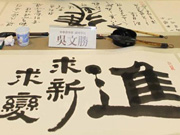 'Jin' named the word of the year by cross-strait netizens
'Jin' named the word of the year by cross-strait netizens PLA elite units unveiled
PLA elite units unveiled 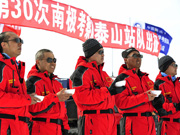 Chinese scientific expedition goes to build new Antarctica station
Chinese scientific expedition goes to build new Antarctica station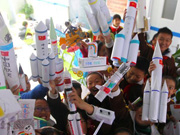 Record of Chinese expressions in 2013
Record of Chinese expressions in 2013 Chinese naval escort fleet conducts replenishment in Indian Ocean
Chinese naval escort fleet conducts replenishment in Indian Ocean Weekly Sports Photos
Weekly Sports Photos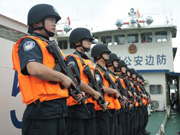 17th joint patrol of Mekong River to start
17th joint patrol of Mekong River to start Spring City Kunming witnesses snowfall
Spring City Kunming witnesses snowfall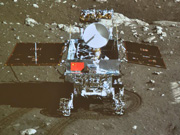 China's moon rover, lander photograph each other
China's moon rover, lander photograph each other Beijing tenants
Beijing tenants  China's aircraft carrier carrys out 1st docking manoeuver in Sanya
China's aircraft carrier carrys out 1st docking manoeuver in Sanya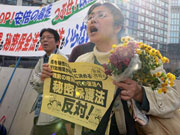 Japanese stage protest against secrecy bill
Japanese stage protest against secrecy bill
Day|Week|Month